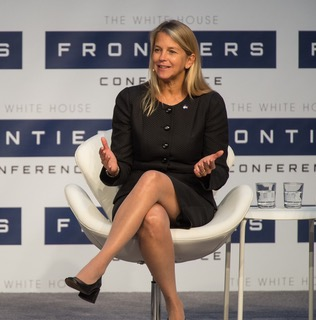Dava Newman, Apollo Program Professor of Astronautics at MIT and immediate-past Deputy Administrator for NASA, will give two lectures at the NSBRI Space Life Sciences Alford-Kennedy Lecture to graduate students in the space life program.
Her first lecture will cover humanities exploration from inner to outer space, and her second will cover human exploration to Mars and beyond. The lecture is meant to discuss key topics in aerospace technology and development and promote the future advancements that will be made possible by the upcoming graduates in these fields.
Students have the opportunity to learn about the biomedical and engineering science contributions to support human presence in space by attending the lecture, said Susan Bloomfield, Newman’s lecture sponsor and associate dean for research in the College of Education and Human Development.
“That is real important to enabling humans working in hostile space environments safely,” Bloomfield said. “Both talks will also address the area of NASA’s future directions and plans for sending humans into deep space, so I think that is the primary motivator for most students.”
Newman’s specialty is spacesuit design and control for astronauts in motion.
“If for example spacesuits can provide the support they do now in terms of a life support, oxygen, adequate temperature regulation, and so forth, but do it with lighter weight suits that are better fitted to individual astronauts it will reduce some of the injuries that astronauts have now, while still providing the life support functions.”
As a leading woman in her field, and the first female engineer to serve as deputy administrator for NASA, Newman portrays a role model for women in STEM fields.
“She is the first to achieve that very high level political appointment job at NASA’s headquarters in D.C.,” Bloomfield said.
However, the future of her field’s students are at the forefront of her passions, Bloomfield said.
“She is first and foremost a faculty member at MIT and is very interested in engaging the public and especially students, both undergraduate and graduate, in the group effort to solve the problems we need to solve to support a human presence in space,” Bloomfield said.
Bonnie Dunbar, director of TEES Institute for Engineering Education and Innovation, is setting up a laboratory similar to the work being conducted at MIT, and will include four new faculty members who will recruit students from graduate and undergraduate levels.
“[We] will be working closely with the NASA Johnson Space Center in Houston on solving technological problems and doing research on new systems for space exploration of humans,” Dunbar said. “The graduate students will have the opportunity to work at the Johnson Space Center.”
For those interested in attending the lectures, “Humanity’s exploration from inner to outer space” will start at 12:30 p.m. in Agriculture and Life Sciences building, room 116, and “Human exploration to Mars and Beyond” will start at 4:15 p.m. in the Cain building, room 202 with a reception to follow.
MIT Astronautics Professor to lecture on future of human presence in space
April 6, 2017

Photo by Courtesy
Newman is an Apollo Program Professor of Astronautics at MIT and immediate-past Deputy Administrator for NASA
0
Donate to The Battalion
$2165
$5000
Contributed
Our Goal
Your donation will support the student journalists of Texas A&M University - College Station. Your contribution will allow us to purchase equipment and cover our annual website hosting costs, in addition to paying freelance staffers for their work, travel costs for coverage and more!
More to Discover









